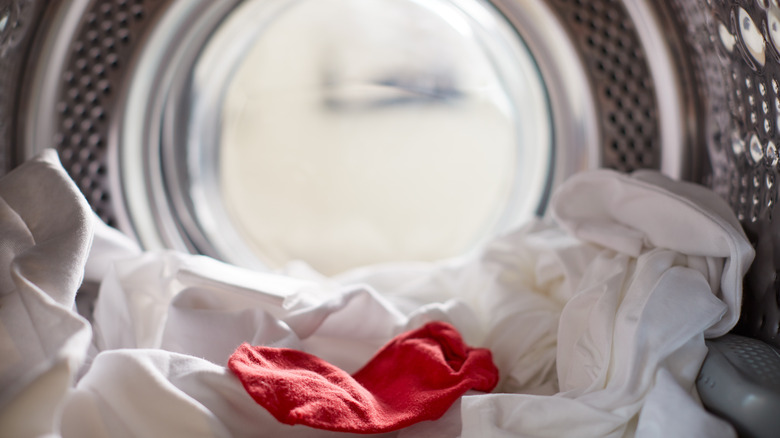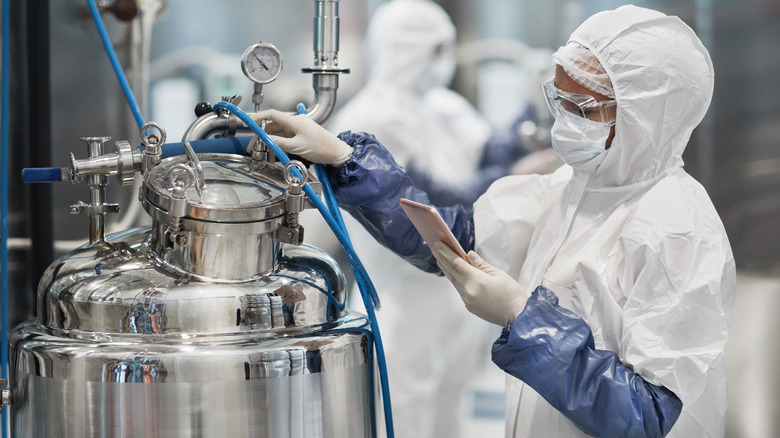The Mistake You're Making With Your New Clothes
There's nothing quite like the feeling of buying new clothes and fashion accessories, whether it's in pristine shopping malls filled with engaging window displays or an online shopping package arriving on your doorstep. With all of the excitement, there's a good chance you're making a mistake with your new clothes.
When we buy new clothes, we expect them to be hygienic. According to a survey by Tommy John, 42% of people in the U.S. wear new clothes without washing them first, because newness is associated with cleanliness. This meaning-making pattern is a misconception, and a falsehood that's easy to believe, since new clothes delivered tightly wrapped in plastic packaging gives the illusion of sterilization. However, the materials packed inside may carry excess dyes and unwanted chemicals that irritate the skin. "When clothes are shipped, they're also kept with some preservatives so that mold won't grow on them during the shipping process if there's moisture," Dr. Lindsey Bordone told Self.
Bordone noted that formaldehyde is one of the primary properties used to treat these new clothing pieces before they are transported. Formaldehyde resins can cause an allergic reaction after making contact with the wearer's skin, specifically eczema outbreaks. Those aren't the only reasons you should wash your new clothes before wearing them, though.
You'd be shocked by what your clothes can carry
New clothes shipped from far-flung factories across the world aren't the only products you need to wash before wearing. Store-bought items are equally as essential to disinfect, since it's impossible to know who handled the clothes before you. Although it's a rare occurrence, certain microbes, like pubic lice, can survive on clothing and be transferred to your skin upon contact. Scabies can also spread through unsanitized apparel and can lead to severe skin infections like impetigo.
Luckily, these infections become noticeable quickly, so if you contract one from your clothing items, you could treat your skin and clothes in good time. The CDC details how to effectively decontaminate clothing infected with these unwanted visitors in its official health reports for the public's convenience. Save yourself the headache, and make a habit of disinfecting your new clothes with natural detergent or chemical sanitizers in a hot rinse cycle, before you wear them out.
Sometimes, the problem doesn't start–or end–with washing
For fashion enthusiasts, there's nothing quite like the dopamine rush of getting a new outfit. However, this heightened experience can be altered when you question how safe it is to wear your clothes. This insecurity goes beyond whether or not it's a good idea to wash new clothing (which, as we established, it totally is), but points to a more significant issue within the fashion industry today. Specifically, how harmful properties are hidden in some clothing products.
A 2021 investigation led by the CBC Marketplace revealed that Shein, a fast fashion label under fire for unsustainable manufacturing practices, sold children's and maternity clothing containing hazardous levels of lead (nearly 20 times the amount Health Canada considers safe for kids). "There were clearly products that were intentionally using lead and intentionally using it in a way that was well above what should be considered responsible–or even safe," said product environmental impacts expert Joël Mertens.
Not only were the investigation findings a wake-up call to environmentalists and policymakers, but to fashion consumers everywhere who need to re-establish trust with brands. Resources like the app Detox Me make it easy to check the credentials of brands that claim to be committed to their customers' health because empowering yourself with knowledge about the clothing you buy is important. It can even be just as critical as washing them that first time.


